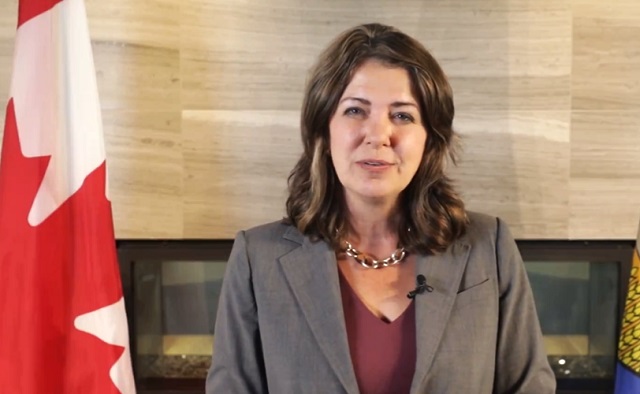Alberta
Alberta Premier Danielle Smith promises bill protecting rights to refuse vaccines is coming

From LifeSiteNews
The plan is to introduce an amended Bill of Rights this fall that includes protections for individuals’ personal medical decisions.
Alberta Premier Danielle Smith has promised that the province’s Bill of Rights will be amended this fall so that there are protections added for people’s personal medical decisions that most likely will include one having the right to refuse a vaccine.
Smith’s promise to add protections for personal choice on vaccinations comes because of the COVID jab mandates put in place for a time in Alberta under former Premier Jason Kenney.
Speaking to Albertans at a recent town hall in Bonnyville, Smith said that the COVID crisis resulted in many people being discriminated against for their own medical decisions and that “it shouldn’t have happened.”
Smith, who leads the United Conservative Party (UCP), said that she believes “every person has to be able to do their own assessment, their own health assessment, to be able to make those decisions.”
The original plan by Smith was to add protections for one’s vaccine status directly Alberta Human Rights Act (AHRA). However, this plan was nixed after she was advised by Public Health Emergencies Governance Review Panel chair Preston Manning that this was not the right legislation for an additional protection.
Instead, Smith promised that a better “law” dealing directly with vaccine status will be forthcoming.
On Monday, Smith confirmed on X that an updated version of the Bill of Rights is coming.
“It’s time. Let’s get this done,” she wrote.
Last year, Smith, as reported by LifeSiteNews, promised to enshrine into “law” protections for people in her province who choose not to be vaccinated as well as strengthen gun rights and safeguard free speech by beefing up the provincial Bill of Rights.
“You have my commitment, no one’s going to be forced to be vaccinated,” Smith told Alberta blogger Shaun Newman.
On Smith’s first day on the job and only minutes after being sworn in, she said that during the COVID years the “unvaccinated” were the “most discriminated against” group of people in her lifetime.
She took over from Kenney as leader of the UCP on October 11, 2022, after winning the party leadership. The UCP then won a general election in May 2023. Kenney was ousted due to low approval ratings and for reneging on promises not to lock Alberta down during COVID.
Smith promptly fired the province’s top doctor, Deena Hinshaw, and the entire Alberta Health Services board of directors, all of whom oversaw the implementation of COVID mandates.
Under Kenney, thousands of nurses, doctors, and other healthcare and government workers lost their jobs for choosing to not get the jabs.
While Smith has not said much regarding the COVID shots since taking office, she has allowed her caucus members to have broad views when it comes to known safety issues related to the jabs.
UCP MLA Eric Bouchard hosted a sold-out event titled “An Injection of Truth” that featured prominent doctors and experts speaking out against COVID vaccines and mandates.
“Injection of Truth” included well-known speakers critical of COVID mandates and the shots, including Dr. Byram Bridle, Dr. William Makis, canceled doctor Mark Trozzi and pediatric neurologist Eric Payne.
The COVID shots were heavily promoted by the federal government and all provincial governments in Canada, with the Alberta government under Kenney being no exception.
The mRNA shots have been linked to a multitude of negative and often severe side effects in children.
2025 Federal Election
Next federal government should recognize Alberta’s important role in the federation

From the Fraser Institute
By Tegan Hill
With the tariff war continuing and the federal election underway, Canadians should understand what the last federal government seemingly did not—a strong Alberta makes for a stronger Canada.
And yet, current federal policies disproportionately and negatively impact the province. The list includes Bill C-69 (which imposes complex, uncertain and onerous review requirements on major energy projects), Bill C-48 (which bans large oil tankers off British Columbia’s northern coast and limits access to Asian markets), an arbitrary cap on oil and gas emissions, numerous other “net-zero” targets, and so on.
Meanwhile, Albertans contribute significantly more to federal revenues and national programs than they receive back in spending on transfers and programs including the Canada Pension Plan (CPP) because Alberta has relatively high rates of employment, higher average incomes and a younger population.
For instance, since 1976 Alberta’s employment rate (the number of employed people as a share of the population 15 years of age and over) has averaged 67.4 per cent compared to 59.7 per cent in the rest of Canada, and annual market income (including employment and investment income) has exceeded that in the other provinces by $10,918 (on average).
As a result, Alberta’s total net contribution to federal finances (total federal taxes and payments paid by Albertans minus federal money spent or transferred to Albertans) was $244.6 billion from 2007 to 2022—more than five times as much as the net contribution from British Columbians or Ontarians. That’s a massive outsized contribution given Alberta’s population, which is smaller than B.C. and much smaller than Ontario.
Albertans’ net contribution to the CPP is particularly significant. From 1981 to 2022, Alberta workers contributed 14.4 per cent (on average) of total CPP payments paid to retirees in Canada while retirees in the province received only 10.0 per cent of the payments. Albertans made a cumulative net contribution to the CPP (the difference between total CPP contributions made by Albertans and CPP benefits paid to retirees in Alberta) of $53.6 billion over the period—approximately six times greater than the net contribution of B.C., the only other net contributing province to the CPP. Indeed, only two of the nine provinces that participate in the CPP contribute more in payroll taxes to the program than their residents receive back in benefits.
So what would happen if Alberta withdrew from the CPP?
For starters, the basic CPP contribution rate of 9.9 per cent (typically deducted from our paycheques) for Canadians outside Alberta (excluding Quebec) would have to increase for the program to remain sustainable. For a new standalone plan in Alberta, the rate would likely be lower, with estimates ranging from 5.85 per cent to 8.2 per cent. In other words, based on these estimates, if Alberta withdrew from the CPP, Alberta workers could receive the same retirement benefits but at a lower cost (i.e. lower payroll tax) than other Canadians while the payroll tax would have to increase for the rest of the country while the benefits remained the same.
Finally, despite any claims to the contrary, according to Statistics Canada, Alberta’s demographic advantage, which fuels its outsized contribution to the CPP, will only widen in the years ahead. Alberta will likely maintain relatively high employment rates and continue to welcome workers from across Canada and around the world. And considering Alberta recorded the highest average inflation-adjusted economic growth in Canada since 1981, with Albertans’ inflation-adjusted market income exceeding the average of the other provinces every year since 1971, Albertans will likely continue to pay an outsized portion for the CPP. Of course, the idea for Alberta to withdraw from the CPP and create its own provincial plan isn’t new. In 2001, several notable public figures, including Stephen Harper, wrote the famous Alberta “firewall” letter suggesting the province should take control of its future after being marginalized by the federal government.
The next federal government—whoever that may be—should understand Alberta’s crucial role in the federation. For a stronger Canada, especially during uncertain times, Ottawa should support a strong Alberta including its energy industry.
Alberta
Province announces plans for nine new ‘urgent care centres’ – redirecting 200,000 hospital visits

Expanding urgent care across Alberta
If passed, Budget 2025 includes $17 million in planning funds to support the development of urgent care facilities across the province.
As Alberta’s population grows, so does the demand for health care. In response, the government is making significant investments to ensure every Albertan has access to high-quality care close to home. Currently, more than 35 per cent of emergency department visits are for non-life-threatening conditions that could be treated at urgent care centres. By expanding these centres, Alberta’s government is enhancing the health care system and improving access to timely care.
If passed, Budget 2025 includes $15 million to support plans for eight new urgent care centres and an additional $2 million in planning funds for an integrated primary and urgent care facility in Airdrie. These investments will help redirect up to 200,000 lower-acuity emergency department visits annually, freeing up capacity for life-threatening cases, reducing wait times and improving access to care for Albertans.
“More people are choosing to call Alberta home, which is why we are taking action to build capacity across the health care system. Urgent care centres help bridge the gap between primary care and emergency departments, providing timely care for non-life-threatening conditions.”
“Our team at Infrastructure is fully committed to leading the important task of planning these eight new urgent care facilities across the province. Investments into facilities like these help strengthen our communities by alleviating strains on emergency departments and enhance access to care. I am looking forward to the important work ahead.”
The locations for the eight new urgent care centres were selected based on current and projected increases in demand for lower-acuity care at emergency departments. The new facilities will be in west Edmonton, south Edmonton, Westview (Stony Plain/Spruce Grove), east Calgary, Lethbridge, Medicine Hat, Cold Lake and Fort McMurray.
“Too many Albertans, especially those living in rural communities, are travelling significant distances to receive care. Advancing plans for new urgent care centres will build capacity across the health care system.”
“Additional urgent care centres across Alberta will give Albertans more options for accessing the right level of care when it’s needed. This is a necessary and substantial investment that will eventually ease some of the pressures on our emergency departments.”
The remaining $2 million will support planning for One Health Airdrie’s integrated primary and urgent care facility. The operating model, approved last fall, will see One Health Airdrie as the primary care operator, while urgent care services will be publicly funded and operated by a provider selected through a competitive process.
“Our new Airdrie facility, offering integrated primary and urgent care, will provide same-day access to approximately 30,000 primary care patients and increase urgent care capacity by around 200 per cent, benefiting the entire community and surrounding areas. We are very excited.”
Alberta’s government will continue to make smart, strategic investments in health facilities to support the delivery of publicly funded health programs and services to ensure Albertans have access to the care they need, when and where they need it.
Budget 2025 is meeting the challenge faced by Alberta with continued investments in education and health, lower taxes for families and a focus on the economy.
Quick facts
- The $2 million in planning funds for One Health Airdrie are part of a total $24-million investment to advance planning on several health capital initiatives across the province through Budget 2025.
- Alberta’s population is growing, and visits to emergency departments are projected to increase by 27 per cent by 2038.
- Last year, Alberta’s government provided $8.4 million for renovations to the existing Airdrie Community Health Centre.
Related information
-

 Censorship Industrial Complex14 hours ago
Censorship Industrial Complex14 hours agoWelcome to Britain, Where Critical WhatsApp Messages Are a Police Matter
-

 Business2 days ago
Business2 days agoTariff-driven increase of U.S. manufacturing investment would face dearth of workers
-

 Education2 days ago
Education2 days agoOur Kids Are Struggling To Read. Phonics Is The Easy Fix
-

 Economy2 days ago
Economy2 days agoClearing the Path: Why Canada Needs Energy Corridors to Compete
-

 Business1 day ago
Business1 day agoCuba has lost 24% of it’s population to emigration in the last 4 years
-

 Media19 hours ago
Media19 hours agoTop Five Huge Stories the Media Buried This Week
-

 2025 Federal Election19 hours ago
2025 Federal Election19 hours ago2025 Federal Election Interference from China! Carney Pressed to Remove Liberal MP Over CCP Bounty Remark
-

 Automotive2 days ago
Automotive2 days agoTrump warns U.S. automakers: Do not raise prices in response to tariffs









